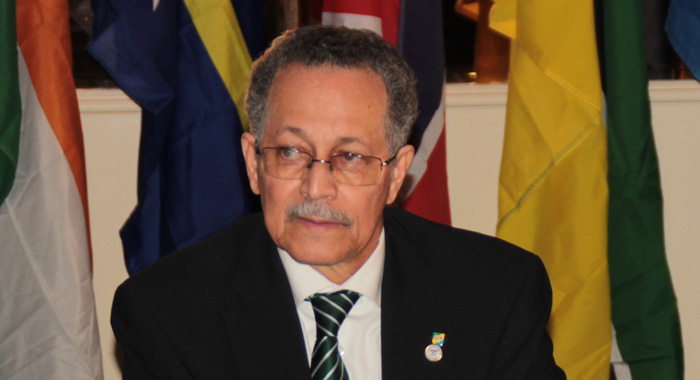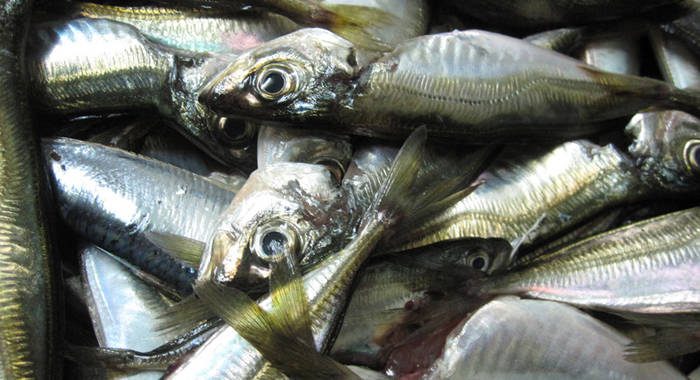By Kenton X. Chance
DAKAR, Senegal (CMC) — African, Caribbean and Pacific (ACP) countries say they are examining how they can more easily access the stringent measures imposed by the European Union on Illegal, unreported and unregulated fishing.
The ACP Council of Ministers at the end of its two-day meeting here Wednesday, also discussed issues relating to the trade in bananas, sugar and other commodities ahead of the joint ACP-EU Ministerial meeting on Thursday.
ACP Secretary General, Patrick I. Gomes, told reporters that only an initial step was made at the World Trade Organisation (WTO) conference in Nairobi last December on the issue of fisheries subsidies.
“You cannot come by the European Union openly, carte blanche and condemn a situation if you have not looked at the measures being taken or also assist with the relevant technical skills or expertise to see,” Gomes said.
The EU earlier this month warned Trinidad and Tobago that it risk being described as being “uncooperative’ in the fight against illegal fishing.
In addition to the Caribbean island, the EU also issued warnings to Kiribati and Sierra Leone that they would receive the yellow card for being “uncooperative in the fight against illegal, unreported and unregulated (IUU) fishing”.
The EU said that its decision is based on its IUU Regulation, which entered into force in 2010. This key instrument in the fight against illegal fishing ensures that only fisheries products that have been certified as legal can access the EU market.
Since November 2012, the Commission said it has been in formal dialogue with several third countries that have been warned of the need to take strong action to fight IUU fishing.
It said formal dialogue is being held with Curacao, the Solomon Islands, Tuvalu, St. Kitts and Nevis, and St. Vincent and the Grenadines, Thailand and with Taiwan.
Meanwhile, Sri Lanka joins the growing list of countries — namely Ghana, Papua New Guinea, Korea, the Philippines, Fiji, Belize, Panama, Togo and Vanuatu — that have reformed their systems following a warning by the EU.

Gomes told reporters that for ACP countries, fisheries will become an important frontier where they will have common guidelines, noting for example that in this way, a fishing agreement with China, Taiwan or other countries would have to subscribe to certain provisions that would help the ACP fishing capacities and reduce depletion of resources or other adverse effect, Gomes said.
“So we are going to be giving very special attention to fisheries, our coastal societies, our coastal villages to both deal with deep sea fishing and more artisanal inland, coastal fishing.”
Gomes said that during the two-day meeting, trading issues were addressed under various commodities.
In the case of sugar, a concern was expressed about the common origin of ACP products so that the bloc can have accumulation and not have to accept the labels that would make it difficult to ship sugar in a more cost effective way from one country to another.
Currently, the EU has a requirement about having to identify the quantities of sugar that come from a particular country.
“We would have a common understanding on that, which would help, therefore, sourcing from those counties that may have a high level of production in one year to satisfy the amounts that are needed in the market.”
He told reporters that that the meeting was able to address issues relating to the banana industry.
“The banana and the fruit that is being demanded now needs a lot of technical skills to prevent the loss and damage to the fruit.

“So an accompanying measures programme has been introduced (and) that is roughly EURO 190 million (One Euro=US$1.29 cents) to be allocated among, I think six or seven of our banana producing countries so that their handling and their cultivation and also their harvesting and shipping of the bananas can be enhanced so that they do not reach to the market in a poor condition.”
The ACP is also looking to expand its export of cashew nuts, for which there is a wide market.
Gomes said that nut has been highly successful, with value addition means for processing and employment, particularly of women in agro-processing and packaging, adding that a wide market is there for cashew nut.
He said the successes of the cashew nut in coastal areas of West Africa coastal areas will be transferred to the Caribbean and Pacific regions.
“So, along those lines, we are negotiating very strongly and looking at terms under which our products can go with more value addition to the European market, which is still a very useful market because it is a high priced market and we have to pursue as best we can in our negotiations.”
Gomes, however, said that to do the negotiations, the bargaining skills within the ACP region must be improved.
“And that’s why we have approved a programme now of 35 million for what is called Trade Capacity Building in our countries.”
He said this will have the possibility of moving trained personnel from country or region to another, adding that in his country, Guyana, he benefitted from the trade expert who came form Uganda and helped Georgetown with its trade policy review.







Bananas in SVG are just about destroyed by the ULP government. They destroyed them but want others including our farmers and the EU to try and revive them.
We are in the middle of a long drought that has destroyed much of the farmers crops. Why? because the ULP government destroyed the irrigation system by neglect then sent home the irrigation workers owing them money.
Our fish is unacceptable in Europe because it is caught, processed and stored in un hygeinic conditions. Laying in dirty boats all day without ice, covered in a piece of dirty sacking or old carpet, the occasional dowsing with a little warm seawater during the day. Then a can of seawater thrown in the boat after unloading, boats never scrubbed or pressure cleaned.
Our fish market in Kingstown has been inspected by the EU several times in the last 15 years only to be rejected because of hygeinic reasons and the fishing methods.
The fisheries and the government are aware but they do nothing about it. You have Saboto Caesar running around spouting nonsense but no action in the right places. Why? Because the government have no money and expect others like the Japanese, the Taiwanese and EU to fix their problems for them.
All the nonsense about flying out fish to London etc..Africa and the Far East sell their fish at cents a pound whilst we are trying to sell fish at dollars.
Then to cap it all we have some guy in a green T shirt saying he is setting up a fish canning facility in SVG. The Canadians and the Brazilians pay 15 cents a pound for sardines for canning, how on earth can we compete with that.
On the windward owners of sheep and goats are allowing them to graze on the stunted peanut crop greenery, that finishes off any possibility of peanut production.
Remember what they used to say “they are not ready yet” and that is a fact the ULP after 15 years are not ready yet.
May I add In warm waters such as ours all boats should go out with ice.
Its common sense that if the EU inspectors of fish are constantly rejecting the fish then something is seriously wrong with the fishing methods used in SVG. Fix it or give up the commercial fishing. If the EU are rejecting the fish then look at it folks – those fish are not good enough for the local market either.
I know the government are lacking funds but are they happy to see the locals getting poisoned from unsanitary fish. Don’t the SVG government care enough to inspect the fish quality themselves or is it total ignorance because that’s how its always been?
The sad fact is the fish are relatively clean when caught in the sea – I would happily eat them if I caught them. Don’t the fishermen understand the need to provide sanitary cooled shaded compartments loaded with ice for the fish they catch. Fishermen if you don’t understand the requirements here then please don’t bother going to work tomorrow find another job that doesn’t involve food because I don’t want to eat nasty sun baked laying on the deck all day rotten fish either.
Its interesting to see that the Taiwanese don’t have the same problem when they catch from the same fish stocks around SVG. Those same fish are happily inspected and welcome back home.